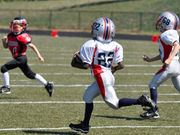However, age of onset not tied to chronic traumatic encephalopathy pathological severity
THURSDAY, May 10, 2018 (HealthDay News) — Younger age of exposure to tackle football predicts earlier neurobehavioral symptom onset among players with chronic traumatic encephalopathy (CTE), according to a study published online April 30 in the Annals of Neurology.
Michael L. Alosco, Ph.D., from Boston University, and colleagues examined the brains of 246 tackle football players donated for neuropathological examination. Of the 211 who were diagnosed with CTE, 126 were without comorbid neurodegenerative diseases. Age of first exposure and age of cognitive and behavioral/mood symptom onset were determined through informant interviews.
The researchers found that when accounting for decade and duration of play, age of exposure was not associated with CTE pathological severity, Alzheimer’s disease, or Lewy body pathology. Every one year younger participants began to play tackle football predicted earlier reported cognitive symptom onset by 2.44 years (P < 0.0001) and behavioral/mood symptoms by 2.50 years (P < 0.0001) in the participants with CTE. For those exposed before age 12 years, earlier cognitive symptom onset occurred by 13.39 years (P < 0.0001), and behavioral/mood by 13.28years (P < 0.0001). Younger age of exposure also corresponded to earlier functional impairment onset in patients dementia.
“Youth exposure to tackle football may reduce resiliency to late life neuropathology,” the authors write. “These findings may not generalize to the broader tackle football population and informant-report may have affected the accuracy of the estimated effects.”
Copyright © 2018 HealthDay. All rights reserved.








